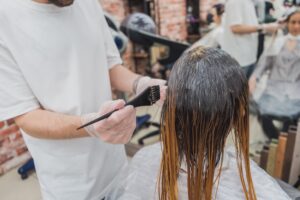What You Need to Know Before Making the Switch

Organic hair color is a great choice for anyone looking for a gentle, non-toxic alternative to traditional hair dye. It’s an excellent way to support organic beauty and sustainable hair care practices. If you’re considering making the switch to organic hair color, here’s what you need to know.
1. What is Organic Hair Color?
Organic hair color is made from natural plant-based ingredients, such as henna, indigo, and cassia. These ingredients are combined to create a wide range of colors, from blonde to black, and can be used to cover gray hair, add highlights, or completely change your hair color.
Unlike traditional hair dyes, which are made with synthetic chemicals and often contain harsh ingredients like ammonia and peroxide, organic hair color is gentle and non-toxic. It doesn’t penetrate the hair shaft like traditional dyes, but rather coats the hair with a protective layer of color.
2. Benefits of Organic Hair Color
There are many benefits to using organic hair color, including:
- Non-toxic: Organic hair color doesn’t contain harsh chemicals like ammonia or parabens, which can damage your hair and irritate your scalp.
- Eco-friendly: Organic hair color is made from natural, renewable ingredients that are sustainably sourced and biodegradable.
- Gentle on your hair: Because organic hair color doesn’t penetrate the hair shaft, it can help protect and strengthen your hair, rather than weaken it.
- Long-lasting: Organic hair color can last just as long as traditional hair dye, and can even improve the health and shine of your hair over time.
- Versatile: Organic hair color can be used to achieve a wide range of colors and effects, from subtle highlights to bold, vibrant hues.

3. Things to Consider Before Switching to Organic Hair Color
Before you make the switch to organic hair color, there are a few things to keep in mind:
- Results may vary: Because organic hair color doesn’t contain harsh chemicals, it may not be as effective at covering gray hair or achieving very light shades.
- It takes longer to apply: Organic hair color often requires more time to apply and process than traditional hair dye, so be prepared to spend a bit more time at the salon.
- You may need a strand test: Because organic hair color can react differently to different hair types and textures, it’s a good idea to do a strand test before applying it to your entire head.
- It can be more expensive: Organic hair color is often more expensive than traditional hair dye, as the ingredients are more expensive and the process can be more time-consuming.
4. Tips for Using Organic Hair Color
If you decide to make the switch to organic hair color, here are some tips to help you get the best results:
- Choose a reputable salon: Look for a salon that specializes in organic hair color, and ask for recommendations from friends or online reviews.
- Be patient: Organic hair color can take longer to apply and process than traditional hair dye, but the results are worth it.
- Use a sulfate-free shampoo: To help maintain your color and keep your hair healthy, use a sulfate-free shampoo and conditioner designed for color-treated hair.
- Protect your hair from the sun: Organic hair color can fade more quickly in the sun, so wear a hat or use a leave-in conditioner with SPF when you’re outside.
- Consider a consultation: If you’re not sure which color to choose or whether organic hair color is right for you, consider scheduling a consultation with a stylist.
In Conclusion
Ultimately, the decision to switch to organic hair color is a personal one that should be based on your unique hair care needs and preferences. If you value organic beauty and want to use natural products that are gentle on your hair and scalp, then organic hair color may be a perfect fit for you. With a bit of patience and care, you can achieve beautiful, long-lasting color that looks and feels great. Plus, you’ll be doing your part to support sustainable, eco-friendly hair care practices.

